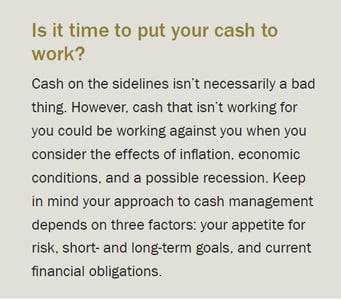
Cash strategies are as unique as one individual to the next — there is no “one size fits all” solution for situations where individuals have excess cash on hand as the result of a bonus, inheritance, windfall, or investment transaction. However, it’s only human nature that most individuals’ first impulse is to sideline their cash as a way to help protect their money.
True, interest rates on accounts where you can stash your cash (e.g., savings, money markets, CDs, etc.) are higher now. However, these options are not expected to keep up with stock market returns over time. Despite getting better interest rates currently than you have in the past, you might be limiting your returns rather than putting your money to work for you long-term.

You may want to consider the following suggestions if you need to develop or tweak your options for sidelined cash.
Fund an Emergency Account
First and foremost, review your monthly budget and use it as a guide to set up an emergency fund for a rainy day or if you ever find yourself having to live on your own savings for an extended time (without tapping into other investments).
It is important to set aside six to twelve months of living expenses in a separate emergency account. (Do not combine these funds with existing checking, savings, certificates of deposit (CDs), and money market assets.)
Deposit enough cash in the emergency account to cover your day-to-day expenses such as food, clothing, medical, and transportation. Put in adequate funds to cover regular monthly payments such as your mortgage, utilities, child care, club memberships, and education costs (i.e., tuition, fees, housing, meals, supplies, incidentals, etc.). Also, you want to have ample cash in the account to cover deductibles for insurance — car, health, and homeowners — should you need to file a claim. In other words, keep cash for all your expected expenses, not just the essentials. That way, you can continue to live the lifestyle you and your family are accustomed to and not dip into other funds for daily and monthly expenses.
Keep in mind the amount of cash in the emergency account should be tailored to your needs — and your family’s — based on your lifestyle. For example, a cash flow plan would be quite different for a retired couple on a fixed income, a single 50-year-old salesperson on commission, and a married-with-family 55-year-old professional on a salary.
Keep Your Overall Wealth Strategy Intact
In other words, stay invested. Without proper planning for an emergency, you might have to gather all your available cash or liquidate a long-term investment. But either of these moves could disrupt your investment plan. For example, if you take a non-qualified distribution from your retirement account prior to retirement, those assets could be subject to tax penalties.
Investors should consider keeping their emergency fund cash separate from cash in their portfolio in order to take advantage of new investment opportunities without having to sell existing investments and potentially create a taxable event.
As far as the stock market is concerned, we seem to be slowly recovering from a volatile year in 2022 – in direct contrast to the record highs experienced in 2021. There is still a fear of continued market volatility as interest rates continue to rise and congress and the White House hash out the details of the debt ceiling.
Still, it is better to stay invested through these bumpy times rather than “park” your money in cash accounts and hope for the “right” time to jump into long-term investments. Unfortunately, often we realize the right time was weeks or even months ago.
Establish a Line of Credit
One way to access cash is to establish a line of credit. Borrowing against the equity in your home or non-retirement investments can provide for short-term cash needs if your emergency fund does not stretch to meet your expenses.
If you’re able to refinance your home at a lower rate, that’s generally a prudent strategy. However, be aware of the overall costs and make sure it supports your long-term goals. For instance, if you are planning to sell your home and move in the near future, reducing your mortgage rate by 0.5% and paying closing costs may not reap the long-term savings you envisioned.
Pay Off Debt or Invest
Paying off debt vs. investing a windfall is a personal choice based on your unique situation. If you’re debt averse, it may give you peace of mind to reduce debt even when your finances could benefit more from investing the cash. However, if you can earn more by investing the money than you would pay in interest on the debt, it’s better to invest. Likewise, if the interest on your debt is more than you would earn through investing, you should consider paying off the debt.
Finance or Pay Cash
Keep in mind the saying “cash is king” may hold up in a high interest rate environment, but not so much when interest rates are low. Let’s say you’re able to invest your cash and earn 8% while borrowing for a car or home loan at a lower percentage rate – it’s more advantageous to borrow for the purchase and invest the cash, earning a higher interest rate. Even a small difference between borrowing rates and interest on earnings can benefit your portfolio.
Borrow Against Your Securities
Many consumers are familiar with mortgages, home equity loans, lines of credit, credit cards, and student or car loans. Investors often have an additional option: borrowing against their securities. With securities-based lending, you retain ownership of your investment while borrowing against the value of it, similar to a home equity line of credit.
Securities-based lending can be a great source of funding for a short-term loan, such as a bridge loan, for example, if you need to buy a new home prior to selling your current one. As long as the security holds its value or increases, you will have a line of credit available for use. If the security declines in value, you may have to pay down the line of credit or sell a portion of the investment to meet minimum requirements. This is a common borrowing strategy among investors because it provides flexibility, a sense of control, and preserves emergency cash.
However, be aware rates on portfolio loans have skyrocketed in the past year alone. While this is a good strategy to access liquidity, rates on these loans are variable and represent some risk if interest rates continue to rise.
We Can Help
These considerations are just a few of the many ways to maximize and manage your excess cash. Contact Commerce Trust today. Our team of professionals can help you explore a variety of options for tailored cash management solutions and assist you with making educated decisions based on your goals and unique financial situation.
True, interest rates on accounts where you can stash your cash (e.g., savings, money markets, CDs, etc.) are higher now. However, these options are not expected to keep up with stock market returns over time. Despite getting better interest rates currently than you have in the past, you might be limiting your returns rather than putting your money to work for you long-term.

You may want to consider the following suggestions if you need to develop or tweak your options for sidelined cash.
Fund an Emergency Account
First and foremost, review your monthly budget and use it as a guide to set up an emergency fund for a rainy day or if you ever find yourself having to live on your own savings for an extended time (without tapping into other investments).
It is important to set aside six to twelve months of living expenses in a separate emergency account. (Do not combine these funds with existing checking, savings, certificates of deposit (CDs), and money market assets.)
Deposit enough cash in the emergency account to cover your day-to-day expenses such as food, clothing, medical, and transportation. Put in adequate funds to cover regular monthly payments such as your mortgage, utilities, child care, club memberships, and education costs (i.e., tuition, fees, housing, meals, supplies, incidentals, etc.). Also, you want to have ample cash in the account to cover deductibles for insurance — car, health, and homeowners — should you need to file a claim. In other words, keep cash for all your expected expenses, not just the essentials. That way, you can continue to live the lifestyle you and your family are accustomed to and not dip into other funds for daily and monthly expenses.
Keep in mind the amount of cash in the emergency account should be tailored to your needs — and your family’s — based on your lifestyle. For example, a cash flow plan would be quite different for a retired couple on a fixed income, a single 50-year-old salesperson on commission, and a married-with-family 55-year-old professional on a salary.
Keep Your Overall Wealth Strategy Intact
In other words, stay invested. Without proper planning for an emergency, you might have to gather all your available cash or liquidate a long-term investment. But either of these moves could disrupt your investment plan. For example, if you take a non-qualified distribution from your retirement account prior to retirement, those assets could be subject to tax penalties.
Investors should consider keeping their emergency fund cash separate from cash in their portfolio in order to take advantage of new investment opportunities without having to sell existing investments and potentially create a taxable event.
As far as the stock market is concerned, we seem to be slowly recovering from a volatile year in 2022 – in direct contrast to the record highs experienced in 2021. There is still a fear of continued market volatility as interest rates continue to rise and congress and the White House hash out the details of the debt ceiling.
Still, it is better to stay invested through these bumpy times rather than “park” your money in cash accounts and hope for the “right” time to jump into long-term investments. Unfortunately, often we realize the right time was weeks or even months ago.
Establish a Line of Credit
One way to access cash is to establish a line of credit. Borrowing against the equity in your home or non-retirement investments can provide for short-term cash needs if your emergency fund does not stretch to meet your expenses.
If you’re able to refinance your home at a lower rate, that’s generally a prudent strategy. However, be aware of the overall costs and make sure it supports your long-term goals. For instance, if you are planning to sell your home and move in the near future, reducing your mortgage rate by 0.5% and paying closing costs may not reap the long-term savings you envisioned.
Pay Off Debt or Invest
Paying off debt vs. investing a windfall is a personal choice based on your unique situation. If you’re debt averse, it may give you peace of mind to reduce debt even when your finances could benefit more from investing the cash. However, if you can earn more by investing the money than you would pay in interest on the debt, it’s better to invest. Likewise, if the interest on your debt is more than you would earn through investing, you should consider paying off the debt.
Finance or Pay Cash
Keep in mind the saying “cash is king” may hold up in a high interest rate environment, but not so much when interest rates are low. Let’s say you’re able to invest your cash and earn 8% while borrowing for a car or home loan at a lower percentage rate – it’s more advantageous to borrow for the purchase and invest the cash, earning a higher interest rate. Even a small difference between borrowing rates and interest on earnings can benefit your portfolio.
Borrow Against Your Securities
Many consumers are familiar with mortgages, home equity loans, lines of credit, credit cards, and student or car loans. Investors often have an additional option: borrowing against their securities. With securities-based lending, you retain ownership of your investment while borrowing against the value of it, similar to a home equity line of credit.
Securities-based lending can be a great source of funding for a short-term loan, such as a bridge loan, for example, if you need to buy a new home prior to selling your current one. As long as the security holds its value or increases, you will have a line of credit available for use. If the security declines in value, you may have to pay down the line of credit or sell a portion of the investment to meet minimum requirements. This is a common borrowing strategy among investors because it provides flexibility, a sense of control, and preserves emergency cash.
However, be aware rates on portfolio loans have skyrocketed in the past year alone. While this is a good strategy to access liquidity, rates on these loans are variable and represent some risk if interest rates continue to rise.
We Can Help
These considerations are just a few of the many ways to maximize and manage your excess cash. Contact Commerce Trust today. Our team of professionals can help you explore a variety of options for tailored cash management solutions and assist you with making educated decisions based on your goals and unique financial situation.
Download the Article
Certified Financial Planner Board of Standards, Inc. (CFP Board) owns the certification marks CFP® and CERTIFIED FINANCIAL PLANNER™ in the United States, which it authorizes use of by individuals who successfully complete CFP Board’s initial and ongoing certification requirements.
The opinions and other information in the commentary are provided as of July 12, 2023. This summary is intended to provide general information only, and may be of value to the reader and audience.
This material is not a recommendation of any particular investment or insurance strategy, is not based on any particular financial situation or need, and is not intended to replace the advice of a qualified tax advisor or investment professional. While Commerce may provide information or express opinions from time to time, such information or opinions are subject to change, are not offered as professional tax, insurance or legal advice, and may not be relied on as such.
Data contained herein from third-party providers is obtained from what are considered reliable sources. However, its accuracy, completeness or reliability cannot be guaranteed.
Commerce Trust is a division of Commerce Bank.
Investment Products: Not FDIC Insured / May Lose Value / No Bank Guarantee
Certified Financial Planner Board of Standards, Inc. (CFP Board) owns the certification marks CFP® and CERTIFIED FINANCIAL PLANNER™ in the United States, which it authorizes use of by individuals who successfully complete CFP Board’s initial and ongoing certification requirements.
The opinions and other information in the commentary are provided as of July 12, 2023. This summary is intended to provide general information only, and may be of value to the reader and audience.
This material is not a recommendation of any particular investment or insurance strategy, is not based on any particular financial situation or need, and is not intended to replace the advice of a qualified tax advisor or investment professional. While Commerce may provide information or express opinions from time to time, such information or opinions are subject to change, are not offered as professional tax, insurance or legal advice, and may not be relied on as such.
Data contained herein from third-party providers is obtained from what are considered reliable sources. However, its accuracy, completeness or reliability cannot be guaranteed.
Commerce Trust is a division of Commerce Bank.
Investment Products: Not FDIC Insured / May Lose Value / No Bank Guarantee

 John Ludlow
John Ludlow